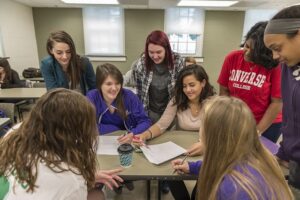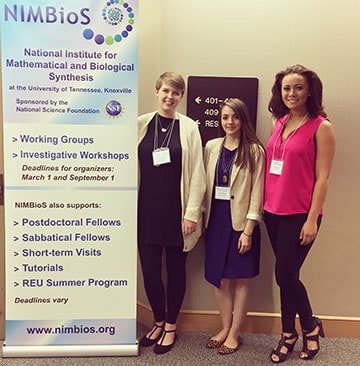More than a Number: Math Professor Dr. Jessica Williams

Dr. Jessica Williams has quickly earned the love and admiration of Converse’s new generation of mathematicians. Why? Just listen to her students:
“You always know she wants you to succeed.”
“She fulfills the role of a mentor as well as that of a professor.”
“She really invests in her students.” A Mathematical Association of America Project NExT Fellow, Converse’s beloved new math teacher had not originally planned to be a professor. Born and raised in small-town Kentucky, Williams recalls how “going off to college felt, simultaneously, like a major, amazing opportunity and a very scary life upheaval. My family is still really impressed, but a little surprised, that I ended up getting a doctorate in math.” With the “110% support” of her family and friends back home, Williams became the first in her family to graduate from college, and then chose to pursue her education even further.
“I don’t see how anyone couldn’t get excited about math when taking her class.”
“I went to graduate school, honestly, simply because I wasn’t finished learning yet. I loved the academic world and, specifically, my study in mathematics. When I began my first teaching assignment as a graduate student it all clicked for me. When I realized I’d convinced some of the students that math could be accessible and even enjoyable, I knew I wanted to keep working towards that goal each semester.” It’s a goal that she consistently meets, as her students are quick to testify. “I don’t see how anyone couldn’t get excited about math when taking her class,” says Taylor Lashley ‘18, a math and Spanish double major with a math secondary ed minor. “From her class structure to her enthusiasm for the subject, you can always see her passion for teaching.”

Instead of the traditional rows of desks facing a lecture podium, an observer walking into one of Dr. William’s classes might find casual clusters of chairs pulled together as students work together on problems and explain concepts to their peers. This student-centric form of instruction is known as inquiry- based learning. “The mathematics community has been increasingly promoting inquiry-based learning in the classroom in recent years,” explains Dr. Williams. “This is due to research showing it has a wide variety of positive effects on student learning and confidence. I do my best to create a friendly, open environment so that students feel comfortable to make mistakes, ask questions, learn from each other, and gain a sense of ownership over the course content.” Students describe Williams’ classes as “fun and challenging,” “relaxing and fun,” and “a wonderful experience.” “She’s very organized and clearly lays out the material on the board…there could be lots of group work and discussion over the material or interesting Tedtalks relating to the subject,” says Ashly Earley, a 2017 Nisbet Honors graduate with a BS in Math and minors in physics and accounting. “She’s always smiling and excited for the day’s material,” adds Taylor. “She is tough, but reasonable. I first met Dr. Williams in her course Number Theory. Ever since then I’ve taken a course with her almost every semester, even if it wasn’t required for the major!”
Preparing Students for Life
For Dr. Jessica Williams, being a professor is about more than getting the subject across. Just as important are those lessons that can only be taught outside the classroom. “I went to a small college myself,” says Dr. Williams. “I remain close with my former professors, and I hope that my students will remain close with me. Outside of the classroom is where a lot of the most meaningful exchanges happen: students coming to office hours to better understand a topic, to ask for academic or career advice, or just to talk about life in general.” This individualized care is by no means lost on her students.
“Outside of the classroom is where a lot of the most meaningful exchanges happen”
“She takes the time to prepare students for their lives after Converse by introducing them to things that aren’t necessarily part of normal classes,” explains Ashly Earley, a 2018 graduate now attending Rensellaer Polytechnic University. “For example, she pushed me to work with LaTeX because she knew I was going to use it in graduate school. LaTeX is a computer programming language that is very friendly with using math symbols for creating documents. I’m currently pursuing a PhD in Mathematics at RPI.” “Getting to know my students over several semesters worth of classes and advising results in a very personal teaching experience,” Dr. Williams explains. “I know how individual students think and learn, and they know what to expect from my teaching as well.”
Taylor Lashley’s favorite memory of Dr. Williams involves a trip they took together to the NIMBioS (National Institute for Mathematical and Biological Synthesis) Conference in Knoxville, TN. “I remember sitting at the lunch table with Dr. Williams and 5 other professors from all over the US. The conversation was centered on teaching and the issues of getting minorities and women into the fields of Mathematics and the sciences. I remember how big a part Dr. Williams played in that conversation. Hearing her experiences and ideas really deepened my respect for her.” Keen in the classroom, consummately professional and deeply caring, Dr. Williams is equally known for her fun side (she has hosted a math department Christmas party, a pumpkin patch field trip, and several informal “math club” events) and for her fashion sense. Ashly Earley loves to tell the story of one of the first Wednesdays of her first class with Dr. Williams. “She walked in wearing a bright pink blazer and students immediately started complimenting her on her blazer. Her first response was, ‘on Wednesdays we wear pink,’ to which the entire class started laughing at the reference .”
Seeing the Possibilities
Dr. Williams hopes to help young women discover not just a basic comfort with math, but an idea of the broad array of career possibilities a math major can open up for them. “A lot of people seem to think the only thing you can do with a math degree is teach it. While that’s clearly the route I chose, it is absolutely not the only option. The problem-solving skills and competency with technical details you learn in mathematics make you very marketable to nearly any industry or business.
The reaction to having a math degree is usually an instant ‘Wow.’ Math majors are well-suited for positions as analysts, researchers, actuaries, statisticians, and in a wide variety of science-oriented graduate programs. Math majors are often also successful in medical school and law school. If you successfully complete a math major, that means you are a top-notch logical thinker. Sky’s the limit!”
